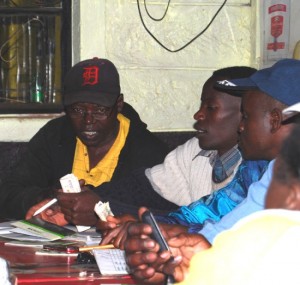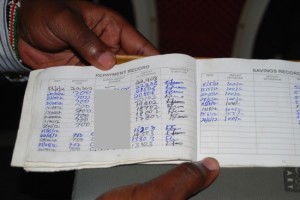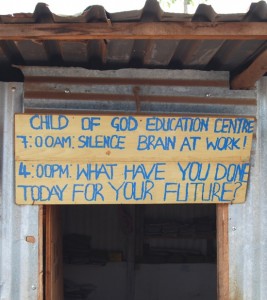An interdepartmental OPIC team traveled to Kenya in June to monitor the performance of three financial institutions whose microfinance lending is supported by the agency: Musoni, the Kenya Women’s Finance Trust, and Equity Bank. Over the course of three days, members of OPIC’s Office of Investment Policy, Portfolio Management Department, Small and Medium-sized Enterprise Finance Department, and Office of External Affairs met with staff from each institution, microloan groups organized by each, and with individual loan recipients. The goal was to assess the financial performance and developmental impact of the institutions’ microfinance lending, and more broadly, their efforts to implement the principles of the Smart Campaign, a global effort to integrate client protection into MFIs’ due diligence, investee selection and loan covenants.
Day One: Musoni and the mobile banking revolution
 They’re everywhere you look in Kawangware, a poor suburb of perhaps 400,000 Kenyans just outside Nairobi: hundreds of little shop fronts – practically one on every block – advertising M-PESA mobile money transfer services. Started just five years ago by mobile network operator Safaricom, M-PESA (M for mobile, pesa for money in Swahili) now boasts a staggering 17 million accounts in Kenya, a nation of 43 million people. That’s Facebook-level recruitment – and no less a technological revolution. Clearly, mobile banking is meeting a need.
They’re everywhere you look in Kawangware, a poor suburb of perhaps 400,000 Kenyans just outside Nairobi: hundreds of little shop fronts – practically one on every block – advertising M-PESA mobile money transfer services. Started just five years ago by mobile network operator Safaricom, M-PESA (M for mobile, pesa for money in Swahili) now boasts a staggering 17 million accounts in Kenya, a nation of 43 million people. That’s Facebook-level recruitment – and no less a technological revolution. Clearly, mobile banking is meeting a need.
One can argue whether M-PESA is in fact meeting or exploiting a need for quick and secure money transfers – it has its share of both admirers and naysayers in the research world – and it has excited a fierce parliamentary debate about whether mobile banking should be regulated.
But driving around Kawangware, it’s hard not to see mobile banking as a bridge over the rudimentary physical and financial infrastructure that hinders Kenya’s economic growth, to a rightful seat in the global marketplace. Given that many of the roads in Kawangware are unpaved and pitted but crowded along their edges by shop owners coursing to the beat of the marketplace, the M-PESA kiosks can seem quite literally a bridge to a better future.
First stop on the OPIC monitoring trip was Musoni, a Kenyan MFI which has received $250,000 in OPIC financing through the Access Africa Fund to expand its mobile phone payment service. It was in fact the first MFI to provide microfinance services exclusively through mobile banking and to develop a technology that interfaces directly between its own IT system and that of the mobile provider.
For CEO David James, who joined Musoni in May after 35 years at Barclays Bank, the revolution is real.
“Mobile, cash-free banking is a true benefit. Customers are able to spend less time counting money and more time in meaningful discussion about their business. Most of their payments are made after working hours – a fact that is very much appreciated by account holders,” James said. “Kenya is far ahead of others in mobile banking. There’s no other country like it.”
James and Chief Operating Officer Norbert Benker gave the OPIC team a candid assessment of Musoni’s microlending history, including a recent struggle to overcome loan repayment difficulties. Benker said a new Standard Arrears Management system, along with improved credit underwriting and recruitment procedures, would prevent future such problems.
Both James and Benker were convinced the Smart Campaign would only contribute the ongoing refinement of Kenya’s microfinance industry, as would a new effort by Kenya’s Association of MFIs to expand credit information sharing to include both positive and negative information.
“The Smart Campaign is part of an overall change of attitude that is integrating social performance measurements into the microfinance industry,” Benker said. “The good data that comes out of [the campaign] will fill gaps and add value to what is already a vibrant sector.”
Bright View Self Help Group
Kawangware
While some of OPIC’s Investment Policy and Project Monitoring team stayed behind to crunch numbers with Musoni staff, the rest of the trip team was driven to a weekly meeting of one of Musoni’s many microloan groups, the Bright View Self Help Group in Kawangware.
The group, assembled in a dark restaurant dining room which belied their name, went about their business quietly: 11 men and nine women confirming loan payments on their cell phones, recording them in ledgers, and filling out loan applications. Hardware store owners, green grocers, scrap metal vendors and second-hand clothing saleswomen, they evinced a level of concentration any graduate school librarian would admire.
Members of the Bright View Self Help Group in Kawangware confirm cell phone payments
during their weekly meeting.
Musoni loan applications and loan payment ledgers speak to the group’s rapid growth.
 Only the awarding of a certificate from Musoni broke the silence for momentary reflection.
Only the awarding of a certificate from Musoni broke the silence for momentary reflection.
Said group chairman Onesmus Kilatia, “We’re very proud [of the certificate] and to be in this position. We’re ready to grow even more. Musoni has helped us to grow and manage many businesses successfully.”
Blessings Hair Salon
Kawangware
Only a few blocks away from the Bright View meeting was Jane Akoth, owner of Blessings Hair Salon. A Musoni client for three years, she recently used a 30,000 Kenyan shilling loan (about USD $350) – to buy new dryers and other machines that have helped her business grow after theft almost ruined her. Musoni’s technology enables Jane and hundreds of entrepreneurs like her to cut out time-consuming trips to the bank and instead focus on the future – which in her case includes a dream to open a small hotel.
“Musoni has really helped me,” Akoth says. “They’re very patient with people, which I appreciate.”
Child of God Education Centre
The second loan recipient visited by the OPIC team, and last stop of the day, was Arcadius Morila, director of the Child of God Education Centre. Hidden from street view behind blue corrugated tin walls, his school seemed nothing less than a tribute to one man’s determination to defy the meager expectations foisted on a poor community. The school burst with energy, most of it trained on the beatific figure of its director.
Morila started the school in 2009 as a feeding program for 70 children in a slum area where many had difficulty accessing decent food reliably.
“Living around here, I saw how difficult things were for children. Many had nowhere to sleep or eat. Many had parents with HIV or epilepsy,” Morila said. “But finding cash to build the school was the biggest problem.”
Morila was introduced to Musoni and joined one of its microloan groups, comprised mostly of shop owners. A 100,000 Kenyan shilling loan followed. “Whereas many community banks require title to secure a loan, Musoni helped us to overcome our difficulties, especially relating to the issue of salaries. Now we have 213 children in this small area.”
The children, ages 3-16, get a balanced diet at the school, including breakfast tea, with tuition rates graduated according to families’ ability to pay. The Greek Orthodox Church provides food as well.
On the day of the OPIC visit, red-sweatered students were busy with tests, but the uplifting mottos that covered nearly every inch of free space on the school’s walls spoke well enough to its commitment to excellence. Morila hopes to parlay his success into support for a secondary school.
“I used to work for the British-American Insurance Company, which was fine,” Morila said as he quietly ushered the OPIC team out. “But when I see a child prosper, I feel truly good, and good about my decision. It’s better to educate somebody, so he can stand for himself. Through Musoni, God will make a way.”
With that the OPIC team returned to its hotel in downtown Nairobi, to be met by a sign in the lobby advertising a meeting of – no kidding – the British-American Insurance Company. Doubtless Arcadius Morila would chuckle at the coincidence. For the OPIC team, it only served to confirm the raised level of interconnectivity enjoyed in Kenya by virtue of its mobile revolution.











